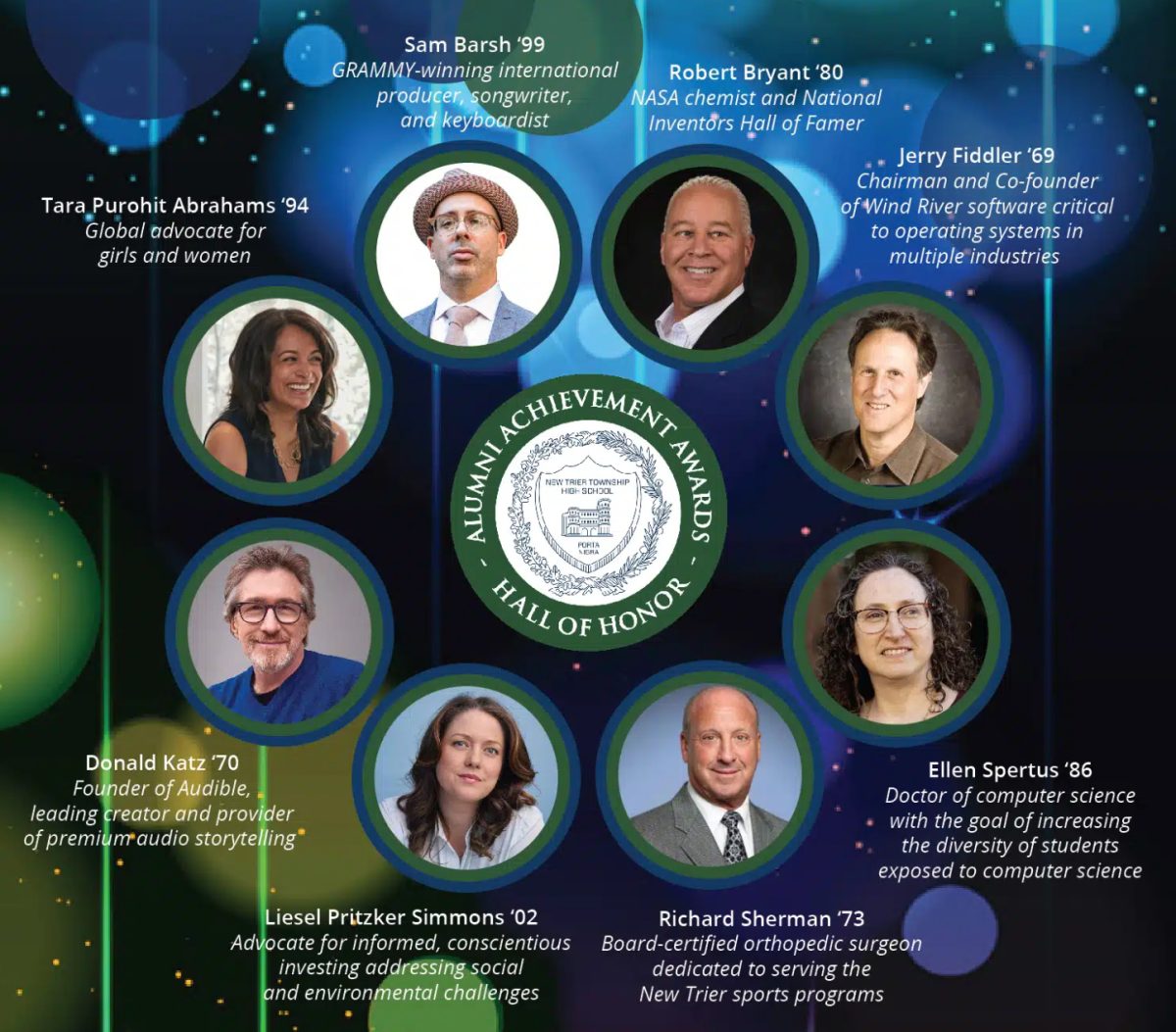On March 8, eight New Trier High School graduates received Alumni Achievement Awards at Gala 2024 and earned their place on the Alumni Hall of Honor. They were honored for their career accomplishments and serve as inspiration for current students as they embark on their own journeys.
New Trier started the biennial Alumni Achievement Awards during the 2010-2011 school year. Award recipients must have graduated from New Trier and have had outstanding careers that have significantly impacted their field for at least five years. They must demonstrate outstanding leadership, character, and service to the community and embody the New Trier motto “to commit minds to inquiry, hearts to compassion, and lives to the service of humanity.”
There have been 70 previous award recipients, such as actor Rainn Wilson, former Chicago Mayor Rahm Emanuel, and former ABC News reporter Ann Compton. The Gala, hosted by the New Trier Educational Foundation, brings the community together.
“This is a wonderful opportunity for the whole community—students, staff, parents, alumni—to come together to honor some exceptional alumni but also to learn about what the Foundation does for the school and how they make a difference in the school,” Nicole Dizon, director of communications and alumni relations, said. She serves as an ex-officio member of the Foundation.
Dizon said New Trier received about 100 nominations, with a few from the previous cycle. When a nomination is not accepted, Dizon said the nominee is considered once more for the next Gala.
This year, some of the honorees are 1994 graduate Tara Purohit Abrahams, a global advocate for girls and women; 1999 graduate Sam Barsh, a Grammy-award winning producer, songwriter, and keyboardist; 1980 graduate Robert Bryant, a NASA chemist who is in the National Inventors Hall of Fame; and 1969 graduate Jerry Fiddler, the co-founder of Wind River Systems, a company that provides device software worldwide.
The other honorees are 1986 graduate Ellen Spertus, who seeks to increase the diversity of students exposed to computer science; 1973 graduate Richard Sherman, an orthopedic surgeon who serves New Trier sports programs; 2002 graduate Liesel Pritzker Simmons, who advocates for investments that address social and environmental challenges; and 1970 graduate Donald Katz, who founded the company Audible.
A couple years ago, a new Young Alumnus Award category, honoring those under age 40, was created to address the age bias in the applicant pool.
“As a committee, we were talking about the fact that a lot of times both the nominations and the people who were chosen were skewing much older and much towards the end of their careers or even having retired or some posthumously,” Dizon said.
The Foundation uses the Gala to connect with alumni and to fundraise for James Marran Grants. Those grants fund educational opportunities of any size and across academics, athletics, and extracurriculars not covered by New Trier’s budget.
New Trier Educational Foundation Executive Director Liz Mayer, a 2002 New Trier graduate, said that as of Feb. 26, the Gala has raised $50,000. With about 235 guests in attendance, more money came from the Gala’s silent auction and paddle raise.
In the past, these grants have gone to help start the e-Sports team at New Trier, getting the Science Department a forensics microscope, and supporting GoBabyGo. In addition, when the Dance Division requested lighting in the Cornog and Gaffney auditoriums, other departments also benefited from that investment.
Mayer said that, to connect alumni with current students, the Gala showcases student work and talent.
“The bases and centerpieces at the Gala are made by our glass art students,” Mayer said. “The Applied Art [Department] is sending over some of the big connect four that they made so that alumni can really tangibly see the impact of the funds we raise.”
Dizon said that honorees speak to students interested to learn more about their career experiences. She feels their stories are critical for students to hear.
“A lot of [the alumni] talk about how they weren’t always at the top of their class and they might have struggled but how they connected with a certain teacher or advisor or program,” Dizon said. “That really propelled them to their future success.









































